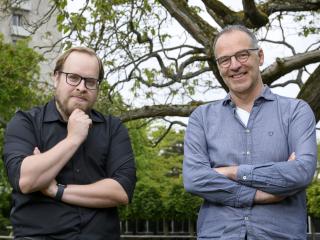ChatGPT | Tilburg University
Developments in the field of Artificial Intelligence present significant opportunities and challenges for society in general, and for our teaching and research in particular. ChatGPT is one of the most talked-about AI tools - but certainly not the only one. With curiosity being deeply ingrained in our core values, we are seizing this development to explore the risks as well as the opportunities presented by these new AI tools. Learning to harness and use AI responsibly in teaching and research is part of this.
What are AI tools, such as ChatGPT?
ChatGPT, which was launched in November 2022 by US company OpenAI, is a chatbot that uses artificial intelligence to provide complex answers quickly to open queries. It can also answer follow-up queries, because ChatGPT is able to ‘remember’ what the user has said earlier in the conversation. At the heart of ChatGPT is a generative Large Language Model (LLM): a neural network trained by humans with vast amounts of text data mostly taken from the internet, including books, articles, Wikipedia entries and Reddit weblinks. One of ChatGPT's strengths is its ability to conduct natural conversations, giving users the feeling of talking to a human being while chatting. Other companies and research groups have now also launched similar LLMs. It is safe to say that LLMs are here to stay.
Since its launch, ChatGPT has attracted significant media attention and the technology is now being used by millions of people worldwide. It is also clear that AI tools, such as ChatGPT, are set to have a major impact on university teaching and research. While there are uncertainties over the longer term and it will take time to shape regulations and policy-making, it is important that we address the implications of LLMs now, particularly with regard to the production and assessment of written works as well as the matter of academic integrity. ChatGPT can, for example, help in answering complex questions and brainstorming as well as in summarizing, writing and correcting texts and programming code.
ChatGPT in education
While the integration of AI into education opens up a multitude of exciting opportunities, there are also challenges in terms of assessment. We educate students with a strong focus on intellectual independence, critical thinking, scientific and social responsibility and entrepreneurship.
Can this tool help us pay even greater attention to reflection and critical thinking about the subject matter of the course? And if so, how? And how do we prevent misuse and fraud, for example with regard to assessment? Our university has set up a ChatGPT working group which is tasked with developing a meaningful and sustainable approach to this changing digital environment. They will shortly issue a set of recommendations and advice for staff and students.
In the longer term, they will explore ways of organizing the education we provide so as to take account of these AI tools and ensure they are integrated into how we learn, study, teach and assess. Teaching on the nature and use of AI tools (including opportunities and risks) should be included in our curriculums. In addition, AI tools can potentially be used to create educational materials, increase student engagement and interaction, and personalize learning experiences.
Tilburg University draws the attention of staff and students who decide to use ChatGPT to the following:
- Everything you share with ChatGPT (in conversations and through uploads) is collected and stored by OpenAI. It is therefore recommended not to share any sensitive information with ChatGPT.
- ChatGPT's answers occasionally contain errors and because ChatGPT does not mention the sources it uses, checking accuracy is very difficult.
- ChatGPT is currently free to use, but it is unlikely to stay that way.
- The servers on which ChatGPT runs consume huge amounts of energy (a typical answer requires several cents worth of power).
- At present, ChatGPT is trained on data from sources available up until September 2021; as a result, it cannot answer queries about events, articles or insights that occurred after this cutoff.
Developments in AI tools are moving at lightning speed. The newest version of ChatGPT, GPT-4, has already been released and there are many other tools available that can do even more; this means that any tips given can quickly become obsolete. You are therefore advised to keep a close eye on developments yourself.
Assessment & fraud
AI tools, such as (ChatGPT), present both challenges and opportunities. A key challenge is how to deal with assessments where AI tools can be used to generate answers. It is our task as an academic institution to be alert to possible misuse or abuse of AI tools like ChatGPT. Lecturers and teaching staff are therefore advised to set out explicitly in assessment descriptions whether and how AI tools may be used. If AI tools may not be used, their use could be considered a form of fraud. If AI tools are allowed to be used, it should be made clear for what purpose. It is further recommended that students be asked to indicate how and for which tasks, assignments or parts of the text the AI tools were used.
Researching ChatGPT
As a university, we are looking for new and fundamental knowledge and insights. We are interested in the unknown and curious about the potential of digitalization in studying the humanities and social sciences. We believe a critical attitude is important in this context.
The developments in Artificial Intelligence (ChatGPT, among other things) force us to consider what these developments and tools may mean for our research. Many of our professors and researchers are involved in these developments from a variety of disciplines (language, communication, artificial intelligence, psychology, law, etc.), following them closely and conducting research on their applications.
Read more:
-
ChatGPT is a pleaser through and through
Everyone will have to deal with ChatGPT and similar large language models sooner rather than later, scientists say. Professor of Communication and Cognition Emiel Krahmer and researcher Chris Emmery have been involved in research on AI and computers for quite some time now and are closely following the launching of the chatbot. It will completely change the way we write, but little thought has been given to its impact, they argue. However, the bot should never be allowed to answer medical questions.

-
‘AI is our core business; our university links people with technology’
ChatGPT has arrived, an application with a huge impact. Eric Postma, Professor of Artificial Intelligence (AI): “For Tilburg University, a product like this come as no surprise." He goes shares a concise description of AI research.

Get to know our scientists:
-

Prof. dr. Emiel Krahmer
Online Media | Cognition | Communication & Online Media -

Dr. Anna Paley
Applying ChatGPT in education | Word-of-Mouth | Purchase -

Dr. Jan de Wit
Human-Computer Interaction | Social Robots -

Prof. dr. Eric Postma
Artificial Intelligence | Knowledge Representation | Computer Models -

Prof. dr. Max Louwerse
Language Psychology | Computer Liguistics -

Dr. Eva Vanmassehove
Natural language processing | Linguistics | Machine Translation -

Prof. mr. Corien Prins
Computer Science Law | Information Technology | Biometrics -

Dr. Chris Emmery
Online Privacy | Machine Learning | User-centered Security -

Dr. Anuj Puri
Ethics of technology | Trustworthy AI -

Dr. Seger Breugelmans
Shame | Multicultural Society -

Prof. dr. Esther Keymolen
Privacy | Data Ethics | Trust -

Prof. dr. Eleni Kosta
Identity Management | Privacy | Surveillance -

Prof. mr. dr. Johan Wolswinkel
Administrative Law | Telecommunications | Games of Chance -

Prof. dr. Floris Bex
Artificial Intelligence | Legal Cases | Bayesian Networks -

Prof. dr. Mijke Houwerzijl
Labor Law | Social Security Law | Social Politics -

Dr. Janneke van der Loo
Linguistics | Academic Dutch | Rhetoric and Persuasion
ChatGPT & Tilburg University in the news
All publications are mostly in Dutch
- Janneke van der Loo te gast bij radio EenVandaag over impact van ChatGPT op het onderwijs - EenVandaag (24 augustus 2023)
- Jan Kragt te gast bij Radio 1 over studenten die ChatGPT gebruiken - Radio 1 (4 augustus 2023)
- Dataverzamelaars VS zetten overheid buitenspel - Computable (July 21, 2023)
- Kan AI een bedrijf leiden? We vroegen het aan 3 experts - Mt/Sprout (July 19, 2023)
- Wimbledon vervangt lijnrechters door AI. 'Ik ga me alleen voelen zonder hen' - Trouw (July 14, 2023)
- WRR-voorzitter Corien Prins: ‘Politiek heeft nog niet voldoende oog voor gevolgen van AI en de gevaren van digitale ontwrichting’ - NRC (June 25, 2023 )
- Erik Postma te gast bij TilbuZz - Omroep Tilburg (June 20, 2023)
- Onderhandelingen definitieve AI-wet van start - BinnenlandsBestuur (June 15, 2023)
- Regulering AI daar wil hoogleraar Eric Postma inzicht in krijgen - Nationale Onderwijsgids/ANP (June 14, 2023)
- De strikvraag als wapen tegen AI-fraude - BeveiligingsWereld (June 7, 2023)
- Frauduleus, dubieus of juist handig: universiteiten oordelen wisselend over ChatGPT als scriptiehulp - NRC (June 6, 2023)
- AI-topmannen waarschuwen tegen de gevaren van AI: 'Dit is hypocriet' - RTL Nieuws (June 3, 2023)
- AI kan verhalen in iemands brein ‘lezen’ - KIJK Magazine (May 2, 2023)
- Eric Postma te gast bij 'Kraak' van Omroep Brabant (April 23, 2023)
- Tweede Kamer bijgepraat door experts over ChatGPT - NRC (April 20, 2023)
- Hoe gevaarlijk is de revolutie van superslimme chatrobots? - Brabants Dagblad (April 14, 2023)
- Opinie | AI vraagt om veel meer dan het indrukken van een pauzeknop - NRC (April 13, 2023)
- Onderwijs na corona: terug naar de collegebanken of is online onderwijs een blijvertje? - Univers (March 21, 2023)
- Wat vinden Tilburgse studenten van ChatGPT? - Univers (January 20, 2023)
- The impact of a new ‘writing robot’: ‘I had ChatGPT take an exam. It got a nine!’ - Univers (December 22, 2022)




